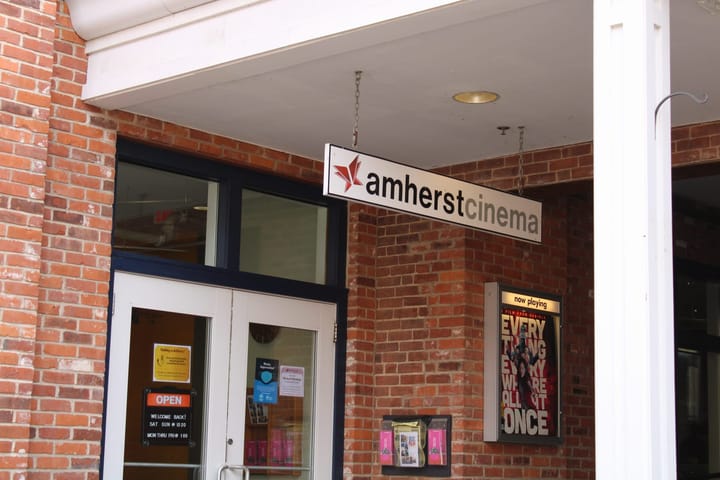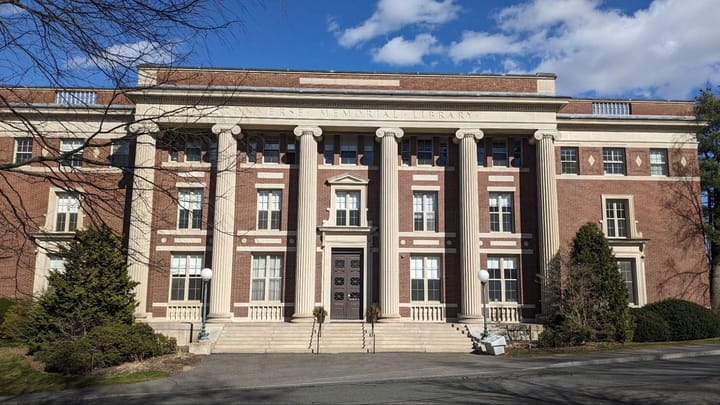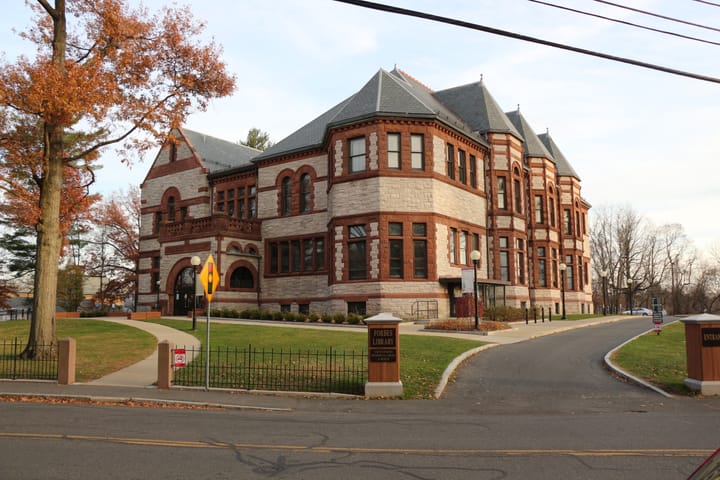The Year In Review
August
The Board of Trustees announces the appointment of Brian J. Conway ’80 and Scott Turow ’70 to the Board of Trustees. Conway replaced Rosanne Haggerty ’82 and Turow replaced George Johnson ’73.
The Special Committee on the Place of Athletics at Amherst releases a report finding an apparent link between athletic participation and academic underperformance. The report used academic qualifications, academic performance and obstacles to achievement of academic potential as tools to analyze the extend of the underperformance of athletes at the College.
September
September
Campus Police investigate extensive vandalism to two bronze sculptures, “Indian Hunter” and “Pronghorn Antelope.” The sculptures were a gift to the College from Herbert L. Pratt, Class of 1895.
Dean of the Faculty Lisa Raskin announces her plans to resign. Raskin will return to the psychology department and neuroscience program.
U.S. News & World Report ranks the College first in its annual rankings of liberal arts colleges. The College has held the top spot for three consecutive years.
The popular Take Your Professor Out (TYPO) program expands to include all students. The program started two years ago as a way for freshmen to become better acquainted with their professors.
Smith College inaugurates Carol T. Christ as its 10th president.
October
October
The National Collegiate Athletic Association (NCAA) announces that the College is tied with Colgate University for the highest graduation rate of African-American students. According to the NCAA, 93 percent of African-American students entering between 1992-93 and 1995-96 graduated. “It’s a testimony to the quality of the faculty and their willingness to support students educationally,” said Dean of Students Ben Lieber.
Campus Police investigate the theft of a multimedia projector belonging to the College, valued at $12,791, from Keefe Campus Center. FLICS relied on the projector to show films every Thursday through Sunday in the Campus Center, but continued to show films using 16mm reels instead of DVDs.
Citing safety issues and concern over the emphasis placed on athletics, the presidents of the 11 NESCAC schools restrict out-of-season practice for varsity teams. The new rule prohibits organized activities, including informal practices and tournaments involving more than a few team members during the off-season.
After delaying its annual audit for the last two years, the Association of Amherst Students (AAS) faces penalties from the Internal Revenue Service (IRS). Budgetary Chair Livia Angiolillo ’04 works to close the books and reconcile expenses and allocations from the past two years.
Demma Rodriguez ’03 and Andrew Kelsey ’05, two students found responsible for the vandalism of the “Indian Hunter” and “Pronghorn Antelope” statues are arraigned at the Northampton District Courthouse. They were charged with “malicious destruction of property” of a value exceeding $250. The students were dismissed from the College with the option to petition for readmission in one year.
One accepted student from Indonesia is prevented from matriculating at the College when his visa is delayed as a result of a new and more strict international student immigration policy implemented after Sept. 11.
In one of several displays of anti-war sentiment throughout the year, a group of approximately 100 five-college students travels to Washington, D.C. to participate in a rally protesting military action against Iraq. “I was moved to be amongst such an overwhelming number of people, many of whom traveled great distances, who were able to take a stand against a war that the administration is forcing upon America,” said Ryan Schenk ’04.
November
November
The Supreme Court of New Hampshire rules that police officers at Dartmouth College can legally search a dorm room for drugs without warrant. The court ruled that constitutional protections did not apply to a student’s room.
Forty-seven colleges and universities throughout Massachusetts sign an agreement pledging to implement policies that would focus on reducing campus binge drinking. The Massachusetts Department of Public Health and the State Attorney General’s Office jointly sponsored the initiative. College officials did not sign the agreement, citing concerns over its “mandatory spirit.” The agreement was proposed after Harvard University released a study showing that New England has the highest rate of underage drinking in the country.
The debate over the existence of diversity seats in the AAS attracts national media attention when the College conservatives try and fail to obtain a seat. FOX News Channel visited the College and aired a special segment on the controversy.
An unusually high number of violent incidents occur over Homecoming weekend, including one altercation in the basement of Davis Dormitory that sent one student and one alumnus to the hospital with stab wounds and resulted in the arrest of two men with no ties to the College.
December
December
The FBI sends a letter to selected colleges and universities requesting they release biographical information about international students. The letter raised questions and concerns regarding what rights colleges and universities have in relation to the release of this information. The College did not receive such a request, but maintained the legality of its refusal to release information about international students without a court order, even in light of the government’s increased attempts to fight terrorism.
Ex-Trustee Thomas H. Wyman ’51 resigns as a member from Augusta National Golf Club in protest of the club’s refusal to admit female members. Wyman estimated that as many as 75 of the approximately 300 club members joined him in supporting the admission of women.
January
January
In a schoolwide referendum, 618 students-38 percent of the student body-vote to strike the concept of diversity seats and all references to them from the AAS Constitution.
The College’s Information Technology (IT) department upgrades from Exchange 5.5 software to Exchange 2000. While Director of Information Technology Phil Fitz expected Exchange 2000 to improve Outlook Web Access and speed up the College’s system, the IT department was plagued by complaints about e-mail access problems throughout the upgrade process.
Barry Flanders, a UMass Campus Police detective, begins to report to the Springfield FBI office as a liaison between the university of the FBI. According to UMass Police Chief Barbara O’Connor, Flanders was helping the FBI weed through the thousands of tips the office had received since Sept. 11.
February
February
President Tom Gerety coordinates a joint amicus brief among 28 of the top liberal arts colleges in the nation supporting the University of Michigan’s race-sensitive admissions procedures. The Supreme Court planned to consider two University of Michigan affirmative action cases during its current term, which ends in June 2003. The colleges filing the brief wanted to make clear that the Court’s decision will affect small colleges in addition to large universities. Chuck Sims ’71, a lawyer who attended Yale Law School with Gerety, handled the legal aspects of the brief. The College does not officially practice affirmative action, but race is one of many factors considered in admissions decisions.
The College announces that the residential master plan will bring the addition of Williston Hall to the room draw list, while North and South Colleges will close for renovation beginning June 1. The College will house freshmen in Pratt Dormitory to accommodate the loss of North and South.
A Hampshire Superior Court judge rejects a motion by Brett Farson, formerly of the Class of 2004, to reverse the College’s decision to suspend him. The College suspended Farson after he was involved in a Nov. 8 altercation in which he allegedly broke another student’s nose.
The Journal of Black in Higher Education ranks the College first among the nation’s liberal arts colleges in the category of average diversity. The Class of 2002 also had the highest black student graduation rate of any college or university in the country. However, the report also noted that the percentage of blacks on the College faculty has declined over the last few years. Blacks compose 5.2 percent of the faculty, while three years ago they made up 6.9 percent.
President Tom Gerety announces that Professor of Mathematics Gregory Call will take over as dean of the faculty on July 1. The appointment is an interim one, according to Gerety, and Call will only serve until the new president appoints a new dean following a search in the next couple of years. Call will take over for current Dean of the Faculty Lisa Raskin, who announced her resignation in September.
Liz Wexler ’03 and Alicia Carrasco ‘ 04E find a ring of master keys that had been taken from a Campus Police cruiser that was left unlocked and running five days earlier. As a security measure, Campus Police had been preparing to re-key approximately 7,000 locks, a process that would have cost up to $210,000. According to Chief of Police John Carter, College officials did not believe that the keys had been duplicated. As a precaution, Campus Police contacted all of the locksmiths in a large radius with the capacity to duplicate the keys, and none reported any attempts to reduplicate. “There’s a belief that it was a prank, but we can’t guarantee it,” said Dean of Students Ben Lieber.
Coretta Scott King, activist and the widow of civil rights leader the Reverend Dr. Martin Luther King, Jr., speaks to the College in Johnson Chapel. Ms. King discussed the significance of her husband’s work and the way the civil rights movement paved the way for mass protests.
March
March
Professor of Philosophy Alexander George circulates a petition to staff and administrators declaring that the signers are opposed to a U.S. attack on Iraq. One hundred and thirty-eight people signed the petition, which George sent to the Office of Public Affairs at the College, which distributed it to news and media outlets. “I thought it would be good to give the Amherst faculty an opportunity to put themselves on the record for being opposed to war at this moment,” said George.
The College releases a report citing an especially large increase in the number of students found guilty of academic infractions compared to last year. Academic infractions have been rising steadily since the early ’90s, with the exception of 2001, and hit an all-time high of 35 cases this year. “For the first time ever, five students were suspended for cheating or plagiarizing a second time. Something is going on, clearly,” said Lieber.
The College announces the appointment of Associate Professor of Psychology Allen Hart ’82 to the position of dean of new students, effective July 1. Hart will replace Dean of New Students and Professor of Mathematics Gregory Call, who will become dean of the faculty.
Following the first U.S. attacks on Iraq, the members of the College community respond to the beginning of the war with discussion and protest. The Progressive Students’ Alliance sponsored a forum in the Red Room for students and faculty members to address the war.
The College announces a 4.9 percent increase in the comprehensive fee over the 2002-03 school year, bringing the total fee for 2003-03 to $36,910. The fee includes tuition, room and board, but does not include the students activities fee, books, personal expenses or travel.
April
April
The College names Columbia Political Science Professor Anthony W. Marx as its 18th President. Marx will take over for President Tom Gerety, who has served for the past nine years and announced his intention to resign last spring. “Hello, Amherst College,” said Marx in his first address to the College community. “I am mindful of the trust that has been placed in me to maintain Amherst College’s greatness and to build upon it. To do so, I will need all of your help.” Marx brings a strong academic background to the College, along with a dedication to higher education. “Tony’s career-and his life-reflect the intersection of three strong interests-the social role of education, contemporary world politics and the workings of history,” said Amos B. Hostetter, Jr. ’58, Chair of the Presidential Search Committee and Chair of the College’s Board of Trustees.
Professor of Political Science William Taubman publishes his two decade long work in progress, “KHRUSHCHEV: The Man and His Era.” The New York Times displayed the book on the front page of its book review and the reviewer called the book “a portrait unlikely to be surpassed any time soon in either richness or complexity.”
Citing safety concerns, the College announces its decision to close off sections of the basements of some former fraternity houses. The basements were often used above maximum capacity during parties and large gatherings. “It poses an inherent risk to the students using the basements because the exiting capabilities for the basements were not designed for such large groups,” said Director of Physical Plant Jim Brassord.
Following the outbreak of Severe Acute Respiratory Syndrome (SARS) in China, two students who were studying abroad in Hong Kong and Beijing return to the U.S. earlier than planned. According to William Hoffa, director of the College’s study abroad program, the program in Beijing closed and the program in Hong Kong had lost most of its students.
The College accepts 922 students of the 5,622 who applied to enter the Class of 2007, an all-time record high number of applicants. The average verbal SAT score was 724, and the average math score was 718.
The Health Insurance Review Committee (HIRC) releases a report of preliminary recommendations for changes to the College’s current health care policy. The recommendations included an increase in office visit co-pay from $5 to $10 and the cessation of benefits for retiree’s spouse after the death of retiree. Although mindful of the increasing costs of health care, faculty members expressed concern over the changes. “My concern had been that the administration and the trustees had been moving too quickly to lower faculty benefits, but I applaud their decision to allow more time for discussion,” said Professor of Chemistry David Hansen.
The Brennan Center chooses Gerety to serve as its next Executive Director. The Brennan Center, associated with the New York University School of Law, is a public interest law firm that undertakes projects focusing on democracy, poverty and judicial independence, according to Gerety. “[Gerety is] someone who has the skills to make this place grow and become more prominent … He will help us become more effective, more powerful in changing laws and policy in a way that helps improve democracy,” said Scott Schell, the director of public affairs at the Brennan Center.
Members of Health Services and Director of Residential Life Charri Boykin-East circulate a letter reporting numerous incidents of vomit in bathrooms across campus. The letter mentioned the biohazards this problem presents and prompted concern on campus over the larger issue of eating disorders.





Comments ()